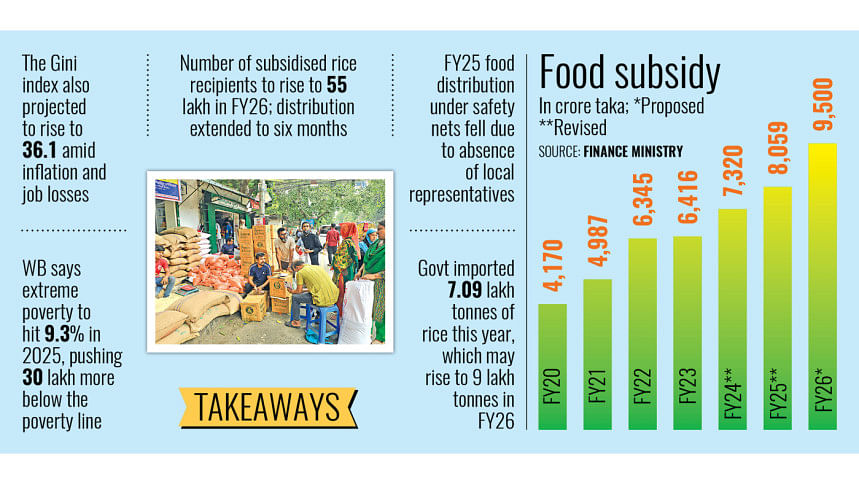Govt plans 31% hike in food subsidy in FY26 budget

The government plans to raise the food subsidy allocation by 31 percent to Tk 9,500 crore in the upcoming fiscal year, aiming to ensure access to affordable food for poor and low-income households.
In the current fiscal year (FY) 2024-25, the food subsidy budget was initially set at Tk 7,200 crore before being revised to Tk 8,059 crore.
Finance ministry officials said the figure may rise even further, due mainly to an increase in rice imports and increased distribution.
Officials said the government has widened its food distribution efforts through food-friendly schemes such as the Open Market Sale (OMS) programme and operations under the Trading Corporation of Bangladesh (TCB).
In the next fiscal year, the number of beneficiary families under these programmes is likely to increase to 55 lakh from the current 50 lakh.
Moreover, each family will receive 30 kilogrammes of rice per month at Tk 15 per kg for six months, an extension from the current five-month duration.
These programmes currently cover 256 upazilas across all eight divisions, targeting areas identified as the poorest by Bangladesh Bureau of Statistics (BBS) surveys.
Although the government expects inflation to ease in the coming year, officials concede that prices may continue to strain household budgets, especially as food inflation has remained above 9 percent since March 2023.
According to the latest Bangladesh Development Update by the World Bank released in April, the national poverty rate is projected to climb to 22.9 percent this year.
Extreme poverty, measured by the international threshold of $2.15 per day, is forecast to rise to 9.3 percent, pushing another 30 lakh into extreme poverty.
The report shows that extreme poverty increased from 5.5 percent in 2023 to 7.7 percent in 2024.
It also said that inequality is likely to worsen, with the Gini index -- used to measure income disparity -- rising from 35.5 to 36.1.
The World Bank attributed this trend to persistent inflation and job losses, which have hit low-income families the hardest.
"Vulnerable populations are likely to face worsening social and economic disparities due to the ongoing economic slowdown," the report added.
In addition to rice, the government also distributed essential food items such as eggs, lentils, soybean oil, and vegetables through the TCB in the current fiscal year.
For FY25, the authorities set a target of distributing 30 lakh tonnes of rice and wheat.
Between July last year and May 15 this year, 26.85 lakh tonnes were distributed, less than the 27.92 lakh tonnes delivered over the same period the year prior, according to the Ministry of Food.
Of the total food distributed this fiscal year, 21.31 lakh tonnes were channelled through food-friendly programmes and the OMS, up from 19.9 lakh tonnes in the previous year.
However, food ministry officials said the distribution of relief under social safety net programmes slowed in rural areas due to absence of elected local government representatives.
Programmes such as Food for Work, Vulnerable Group Feeding, and Vulnerable Group Development saw reduced delivery, with a total of 5.55 lakh tonnes distributed up to May 15 -- down from 7.5 lakh tonnes in the same period last year.
The government has also had to ramp up rice imports as local production fell due to recurrent floods and natural disasters.
So far this fiscal year, 11.5 lakh tonnes of food, including 7.09 lakh tonnes of rice, have been imported. Officials expect rice imports to reach 9 lakh tonnes in the next fiscal year.
By comparison, the government did not import any rice during the same period last year but brought in 7.84 lakh tonnes of wheat.


 For all latest news, follow The Daily Star's Google News channel.
For all latest news, follow The Daily Star's Google News channel. 



Comments